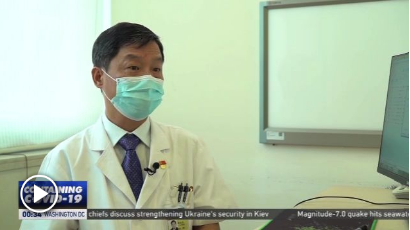China Medical Workers' Day: Beijing doctor: Cross-hospital network needed for new challenges
Author: CGTN CopyFrom: PUMCH UpdateTime: 2020.08.20

As China marks its third Medical Workers' Day today, CGTN revisits a doctor in Beijing who was in Wuhan earlier this year, to help treat COVID-19 patients. He says it's important to plan ahead and take precautions in case of any new diseases and challenges. Tang Bo has the story.
DR. LI TAISHENG Peking Union Medical College Hospital "The report does say the spleen is enlarged. Indeed, but how big is it? The normal size is 4 centimeters, and this one is 4.3. Of course, the ultrasound department would claim it abnormal enlargement, but it's not that bad."Doctor Li Taisheng is guiding his Ph.D. students while seeing patients. As the head of the infectious diseases department at Peking Union Medical College Hospital, Li has been working there for 36 years. He is one of the top infectious diseases specialists in China which is why he was entrusted with a mission to fight the battle against COVID-19 in Wuhan earlier this year.
DR. LI TAISHENG Peking Union Medical College Hospital "We found some special physical changes in the infected patients, including the symptom of black fingertips caused by severe blood clotting. We continued our research on COVID-19 after we get back from Wuhan. We have also been keeping in touch with local medics in Wuhan who help us check on the recovered patients."
Li had some hard times after returning from Wuhan, feeling anxious and depressed. It was largely due to the post-traumatic stress disorder, or PTSD, which affected many of the assisting medics who were sent to Wuhan.
Li recovered with the help of his family and colleagues. Over the past 10 years, Doctor Li has been working on building a laboratory platform which can help improve the treatment of severe illnesses, including the use of antibiotics, and HIV/AIDS treatment. Now he's got a new idea.
DR. LI TAISHENG Peking Union Medical College Hospital "The infectious diseases department of a general hospital should be able to work along with other departments in coping with new or sudden public health emergencies similar to the COVID-19 epidemic. We need to build up a cross-hospital network to integrate all medical resources. We should always be prepared and be able to fight as soon as we are needed."
TANG BO Beijing "Nobody knows what new disease may emerge in the future. Doctor Li says medical workers should not be afraid of innovating, and questioning authorities – and that they should do clinical practice as much as possible. This is what doctors need to do when coping with new challenges. Tang Bo, CGTN, Beijing."
